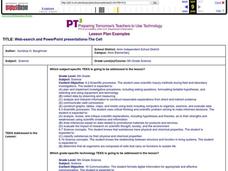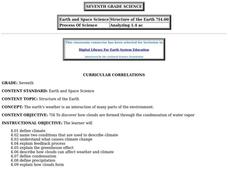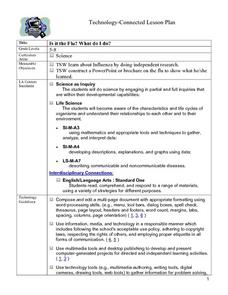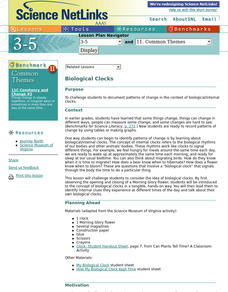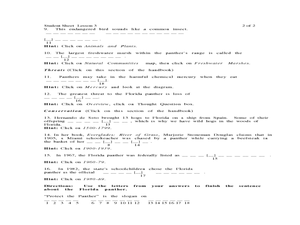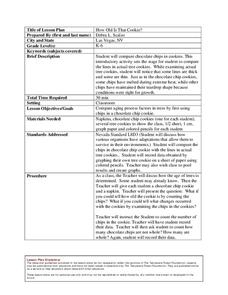Curated OER
Everything's Connected
Learners explore how trash decomposes. In this ecosystem lesson, students discuss new vocabulary words, such as producers and consumers, and think critically to answer how landfills work.
Curated OER
Burs in Your Furs
Students explore the concept of animal welfare. In this wild animal habitats activity, students discover the work of wild animals in sustaining their habitats as they participate in a classroom simulation. Students discuss how wildlife...
Curated OER
Healthy Hearts
Learners research the basic concepts of heart health and disease and become an expert in an area as it relates to the heart and circulatory system. They prepare a multimedia presentation of their findings.
Curated OER
Down, Dung and Dirty
Students investigate the stages of succession in animal dung communities. They create a dung culture using fresh cow, goat or horse dung then record data on the fungal species that appear over a two week period.
Curated OER
Exploring Ecosystems
Fourth graders investigate ecosystems. In this ecosystem lesson, 4th graders explore producers, consumers, and decomposers and study the interdependence of each.
Curated OER
Web-search And PowerPoint Presentations-The Cell
Sixth graders create a PowerPoint presentation using information that they have compiled from their web search and rubric web sites, text and other applicable references. They work in pairs to complete these searches and projects.
Curated OER
Structure of the Earth
Seventh graders study the cause of climate change, and how clouds form and affect weather. They define condensation and precipitation, the greenhouse effect and the water cycle.
Curated OER
Rain Reasons
Students explore how climatic factors influence the growth of plants. They create an experiment to find how variations in water, light, and temperature affect plant growth and describe how precipitation and geography can affect the...
Curated OER
Animal Research Project
Third graders prepare an oral report using Appleworks to present information on their animal. They write a short narrative comparing and contrasting their animal to another students and, after watching other presentations, discuss what...
Curated OER
Populations and Ecosystems
Sixth graders examine the factors that influence the stability of ecosystems. They construct a miniature ecosystem in a jar that includes plants, small fish, and snails, record the population changes over a period of four weeks, and...
Curated OER
Ecology: Factors Influencing Animal Populations
Students assess the factors affecting animal populations. Working in groups they define specific vocabulary terms and complete several activities from "Project Wild."
Curated OER
People Are Like Peas in a Pod
Students experiment with peapods to show the diversity of individual within a population. They examine dominant traits, recessive traits, genotypes, and phenotypes and show the process of making a Punnett Square.
Curated OER
Is It The Flu? What Do I Do?
Students use the internet to research the flu. Using various websites, they identify who should get flu shots, how to protect themselves and guidelines for getting over the flu. They write a one page report on their findings to end the...
Richland County School District One
Incubating Quail Eggs
Students incubate quail eggs. In this biology lesson, students observe the development of the embryo, monitor, turn, weigh the eggs, and observe the hatching of the chicks. They identify the structures within a fertilized egg and their...
Curated OER
Air Quality and Transportation in the Tulsa Area
Students investigate the effects of air pollution. In this environmental lesson, students discuss the causes of air pollution and identify how transportation has an effect on the air quality. Students identify other alternatives to driving.
Curated OER
Cleaning Up
Students demonstrate how to be a philanthropist. In this philanthropy lesson plan, students read the story The Wartville Wizard and discuss ways to become a philanthropist. Students participate in a good deed by volunteering to clean up...
Curated OER
Water 1: Water and Ice
Students investigate water in its solid and liquid form. In this states of matter instructional activity, students experiment to see what happens as water goes from a solid, ice, to a liquid, water, and back again. They write about and...
Curated OER
Panther Scavenger Hunt
Students research a website to learn about the Florida panther. In this animal research lesson, students use the scavenger hunt directions to search a website about Florida panthers. Students also solve word puzzles within the activity.
Curated OER
How Old is that Cookie?
Students investigate adaptation. In this cookie age activity, students examine changes and variations in chocolate chips in cookies in preparation for determining the age of trees using lines. Students discuss how the age of...
Curated OER
Design of Airfoil for Given Lift
Students use FoilSim to design an airplane wing that generates a given lift. As they change parameters such as airspeed, altitude, angle of attack, thickness and curvature of the airfoil, and size of the wing area, the software...
Curated OER
Radioactive Decay
Students explore what radioactive decay is and are able to relate it to the concept of half-life. They are given 100 green beads that represent radioactive atoms and 100 white beads that represent stable, non-radioactive daughter atoms....
Curated OER
Ecosystems
Students create plots of land in three different ecosystems and use AppleWorks to collect data for research. This lesson includes a downloadable worksheet and can be accomplished in four days.
Curated OER
Just Bee-Tween Flowers!
Pupils examine the major plant and bee parts and the interdependency between bees and fast plants. They observe and record the stages of growth of fast plants, take photos of the plant's life cycle, and cross-pollinate plants.
Curated OER
Flowers, Pods, and Seeds
Students gain an understanding of living organisms. the complete a plant growth data log to chart plant growth and to make observations, predictions, and personal reflections.





